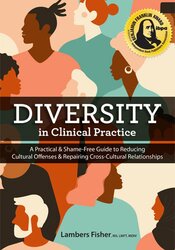Intro to Diversity in Clinical Practice

Join PESI speaker Lambers Fisher in exploring his debut book: Diversity in Clinical Practice. Applicable for a wide range of professions—including counselors, religious leaders, occupational therapists, educators, coaches, physical therapists, and nurses—this book is filled with practical and impactful strategies to help you increase your cultural competence, reduce cultural offenses, and repair damaged relationships.
Why Should We Increase Our Cultural Competence?
The world is changing. Not only is the world changing, but the country is changing. Maybe even your city, community, or family are changing. As demographics continually change, the people you encounter on a daily basis change as well. Whether it’s increased varieties of ethnic groups, increased freedoms for individuals to express their gender and sexual orientation, varying political beliefs, or differing rural versus urban values, things are slowly changing, and we need to be able to adjust to those changes.
Our comfort zones must expand. Since the world is continually changing, we don’t have the luxury to stay within our comfort zone. Sure, we all have a comfort zone, and that’s okay. But if your comfort zone is so small that it limits whom you can help and how much you can help, then it is your responsibility to grow as the opportunity arises.
I like to think of it like a playground game of tag. You begin with a home base, where you’re safe. Then when the opportunity arises, you run around a bit, and then you run back to your safe home base. Similarly, I think it’s perfectly healthy to have a personal and professional home base—things you experience as normal, comfortable, and easy. However, every once in a while, I believe that it is beneficial to branch out of what is comfortable and easy and to try something new. Learn about someone else, take a healthy interest in someone else’s normal, and make efforts to meet the needs of someone new to you.
There is no need to feel pressure to learn everything about everyone. That would be impossible. After all, no matter how large you expand your comfort zone, there will still be something outside of it. So learn to accept the benefits of your comfort zone— your scope of competence—and then make the most of opportunities to expand it.
Professional bubbles no longer match clientele. There once was a time when professionals could operate in a professional bubble. Many times, this bubble was created very unintentionally: “I don’t mean to operate in a professional bubble. I just happen to work in this certain suburb, which has a large percentage of this certain population, which tends to have a particular need that I have become very good at addressing. So I don’t really have to expand beyond this bubble or my professional comfort zone.” In one sense, that perspective has merit. However, in another sense, that perspective has significant limitations. Even if you are able to stay in the comfort zone of your professional bubble, despite the changing world around you, the reality is that your clients do not live in that same professional bubble. To remain effective at helping your clients live in a diverse world, it behooves you to branch out and to get to know that world outside of your comfort zone.
We have an ethical mandate to maintain cultural competence. Most professional licensing boards—including, but not limited to, boards of psychology, marriage and family therapy, social work, and counseling—have published ethical codes of conduct, which at the very least have some type of disclaimer discouraging discrimination based on factors such as race, age, ethnicity, culture, color, socioeconomic status, mental or physical disability, language, gender, health status, religion, national origin, immigration status, political belief, sexual orientation, gender identity, or relationship status. This is the minimum standard. However, shouldn’t our goal be to exceed this standard? Shouldn’t we go beyond not discriminating and learn to appreciate different experiences, identities, and perspectives? I believe this extra step is a significant step on the journey toward increased cultural competence.
Cultural competence leads to greater client satisfaction and rapport. Making the effort to understand and help your clients feel understood is one of the core components of building therapeutic rapport. We can accomplish that task by making efforts to understand our clients’ presenting struggles, as well as their personal experiences and the culture in which they have developed and are learning to overcome those struggles.
Cultural competence enhances our professional effectiveness. Building healthy therapeutic rapport not only helps increase client satisfaction, but it is also correlated with increased therapeutic effectiveness. When a client feels understood by their therapist, they are more likely to be receptive to therapeutic insights and challenges and more compliant with treatment strategies and recommendations. This ultimately leads to improved treatment outcomes.
*This is an adapted excerpt from Diversity in Clinical Practice by Lambers Fisher. Copyright © 2021, Lambers Fisher. PESI Publishing.
Why Should We Increase Our Cultural Competence?
The world is changing. Not only is the world changing, but the country is changing. Maybe even your city, community, or family are changing. As demographics continually change, the people you encounter on a daily basis change as well. Whether it’s increased varieties of ethnic groups, increased freedoms for individuals to express their gender and sexual orientation, varying political beliefs, or differing rural versus urban values, things are slowly changing, and we need to be able to adjust to those changes.
Our comfort zones must expand. Since the world is continually changing, we don’t have the luxury to stay within our comfort zone. Sure, we all have a comfort zone, and that’s okay. But if your comfort zone is so small that it limits whom you can help and how much you can help, then it is your responsibility to grow as the opportunity arises.
I like to think of it like a playground game of tag. You begin with a home base, where you’re safe. Then when the opportunity arises, you run around a bit, and then you run back to your safe home base. Similarly, I think it’s perfectly healthy to have a personal and professional home base—things you experience as normal, comfortable, and easy. However, every once in a while, I believe that it is beneficial to branch out of what is comfortable and easy and to try something new. Learn about someone else, take a healthy interest in someone else’s normal, and make efforts to meet the needs of someone new to you.
There is no need to feel pressure to learn everything about everyone. That would be impossible. After all, no matter how large you expand your comfort zone, there will still be something outside of it. So learn to accept the benefits of your comfort zone— your scope of competence—and then make the most of opportunities to expand it.
Professional bubbles no longer match clientele. There once was a time when professionals could operate in a professional bubble. Many times, this bubble was created very unintentionally: “I don’t mean to operate in a professional bubble. I just happen to work in this certain suburb, which has a large percentage of this certain population, which tends to have a particular need that I have become very good at addressing. So I don’t really have to expand beyond this bubble or my professional comfort zone.” In one sense, that perspective has merit. However, in another sense, that perspective has significant limitations. Even if you are able to stay in the comfort zone of your professional bubble, despite the changing world around you, the reality is that your clients do not live in that same professional bubble. To remain effective at helping your clients live in a diverse world, it behooves you to branch out and to get to know that world outside of your comfort zone.
We have an ethical mandate to maintain cultural competence. Most professional licensing boards—including, but not limited to, boards of psychology, marriage and family therapy, social work, and counseling—have published ethical codes of conduct, which at the very least have some type of disclaimer discouraging discrimination based on factors such as race, age, ethnicity, culture, color, socioeconomic status, mental or physical disability, language, gender, health status, religion, national origin, immigration status, political belief, sexual orientation, gender identity, or relationship status. This is the minimum standard. However, shouldn’t our goal be to exceed this standard? Shouldn’t we go beyond not discriminating and learn to appreciate different experiences, identities, and perspectives? I believe this extra step is a significant step on the journey toward increased cultural competence.
Cultural competence leads to greater client satisfaction and rapport. Making the effort to understand and help your clients feel understood is one of the core components of building therapeutic rapport. We can accomplish that task by making efforts to understand our clients’ presenting struggles, as well as their personal experiences and the culture in which they have developed and are learning to overcome those struggles.
Cultural competence enhances our professional effectiveness. Building healthy therapeutic rapport not only helps increase client satisfaction, but it is also correlated with increased therapeutic effectiveness. When a client feels understood by their therapist, they are more likely to be receptive to therapeutic insights and challenges and more compliant with treatment strategies and recommendations. This ultimately leads to improved treatment outcomes.
*This is an adapted excerpt from Diversity in Clinical Practice by Lambers Fisher. Copyright © 2021, Lambers Fisher. PESI Publishing.
Build Rapport with Diverse Clients

Too often, therapists and other helping professionals feel paralyzed by the fear that they don’t know enough about other cultural groups to counsel clients different than themselves. In his debut book, Diversity in Clinical Practice, Lambers Fisher sets out to mitigate these fears by providing a framework for professionals to better understand the experiences of cultural groups with whom they are not personally or professionally familiar.
With his encouraging and non-shaming approach, Lambers will challenge you to learn more about other cultures, accept what you do not yet know in the process, and utilize strategies that can help you become an increasingly culturally competent professional. Beyond ethnicity, you will explore issues of age, gender, sexuality, religion, acculturation, and social justice, as well as identify opportunities to strengthen your own cultural self-awareness.
With his encouraging and non-shaming approach, Lambers will challenge you to learn more about other cultures, accept what you do not yet know in the process, and utilize strategies that can help you become an increasingly culturally competent professional. Beyond ethnicity, you will explore issues of age, gender, sexuality, religion, acculturation, and social justice, as well as identify opportunities to strengthen your own cultural self-awareness.





